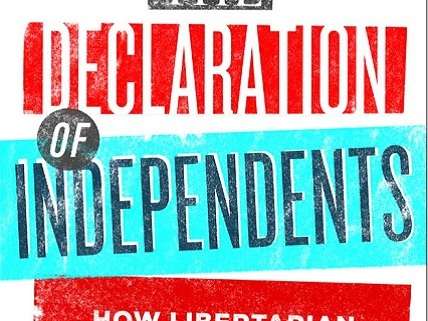Powerful: GOP Congressman Scott Rigell Video Endorsement of Libertarian Gary Johnson
"There's a different way....We can change things. We can change the system."
That's Scott Rigell, a Republican congressman from Virginia who broke party ranks to endorse Libertrian presidential nominee and former two-term New Mexico Gov. Gary Johnson back in August. The mere fact of partisans such as Rigell splitting their votes is important, of course—it's a bold, even courageous example, and a necessary one for an era in which voter identification with the major parties is going down like the Titanic:

.
But Rigell's specific argument in the video is also important. In less than two minutes, he stresses that nobody has to accept the two unacceptable major-party candidates or the awful platforms they are espousing (protectionism, statism, overseas interventions, increases in the size, scope, and spending of government). There's a different way says Rigell. "We don't just have two choices. We have a third choice, a better choice….We can change things. We can change the system."

Among the many ways "we can change the system" is by evacuating the duopoly in politics the same way that we've evacuated false binaries and harshly limited choices in all other aspects of our lives. We no longer allow, for instance, our options in automobilies to be dictated by the Big Three automakers and we're better off for it. On more important levels, we no longer our cultural choices to be forced on us by the three or four TV networks or a handful of book publishers, record labels, and film studios. When it comes to our most lifestyle choices and identities, we no longer submit to dualistic categories such as black/white, male/female, gay/straight as the only way—or even a particularly meaningful way—to structure our world.
As Matt Welch and I argued in The Declaration of Independents, politics is a lagging indicator of where America is headed and always the last institution to change its ways. What we have been witnessing throughout 2016 is a damn-near perfect illustration of our thesis that the same sort of proliferation in choice and increasingly individualized options in our work, cultural, and social lives is coming to politics. Characters such as Scott Rigell are in the vanguard of that movement, if only because he dares to speak as a Republican what we all know to be true: The established parties can't even represent their own members any more. We need more, better choices in politics just as we needed them in cars and we'll get them sooner or later.
And it's important to note that the push for more and better choices isn't simply limited to the historically string response to Gary Johnson this time around. The Bernie Sanders insurgency suggests that many in the Democratic Party feel cheated by that party's current iteration, as does a continuing lack of enthusiasm for Hillary Clinton. That Trump won the GOP nomination is evidence of the same and so does relatively strong showing by late-to-the-race independent Evan McMullin and stronger-than-expected polling by Green Party nom Jill Stein. Something is happening here that is actually different than in the past, even though the winner of the 2016 election will be from a party founded before the U.S. Civil War.
Former political consultant (he worked with both parties) and current ABC News analyst Matthew Dowd is framing a similar scenario to the one in The Dec. of Ind.:
It is time we reject the messaging from the two major parties, and make choices in our own hearts that help bring the country together. If you don't feel good about either major party choice, then don't be shoved into choosing between what they describe as "the lesser of two evils."
Make an independent and innovative choice that may not win this year, but over time will be successful in reuniting us as a country. We need independents to take back our country and unite us. It is only a binary choice if we listen to the duopoly.
If the 20th century was in many, necessary ways a "binary century," the 21st is something altogether different but it won't be called into existence without the independent actions of individuals refusing to conform to pre-existing categories that stultify and squelch what we actually want out of life. We didn't stand for it in our personal lives, our economic lives, our cultural lives—and now we are refusing to take it in our political lives.


Show Comments (141)